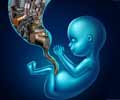A new US study has found that the bodies of almost all pregnant women carry multiple chemicals.

The study marks the first time that the number of chemicals to which pregnant women are exposed has been counted.
Analyzing data for 163 chemicals, researchers detected polychlorinated biphenyls (PCBs), organochlorine pesticides, perfluorinated compounds (PFCs), phenols, polybrominated diphenyl ethers (PBDEs), phthalates, polycyclic aromatic hydrocarbons (PAHs) and perchlorate in 99 to 100 percent of pregnant women.
Among the chemicals found in the study group were PBDEs, compounds used as flame retardants now banned in many states including California, and dichlorodiphenyltrichloroethane (DDT), an organochlorine pesticide banned in the United States in 1972.
Bisphenol A (BPA), which makes plastic hard and clear, and is found in epoxy resins that are used to line the inside of metal food and beverage cans, was identified in 96 percent of the women surveyed.
Prenatal exposure to BPA has been linked to adverse health outcomes, affecting brain development and increasing susceptibility to cancer later in life, according to the researchers.
Advertisement
"It was surprising and concerning to find so many chemicals in pregnant women without fully knowing the implications for pregnancy," said lead author Tracey Woodruff, director of the UCSF Program on Reproductive Health and the Environment.
Advertisement
Exposure to chemicals during fetal development has been shown to increase the risk of adverse health consequences, including preterm birth and birth defects, childhood morbidity, and adult disease and mortality according to the research team.
In addition, chemicals can cross the placenta and enter the fetus, and in other studies, a number of chemicals measured in maternal urine and serum have been found in amniotic fluid, cord blood and meconium, they state.
The findings have been published in Environmental Health Perspectives.
Source-ANI















